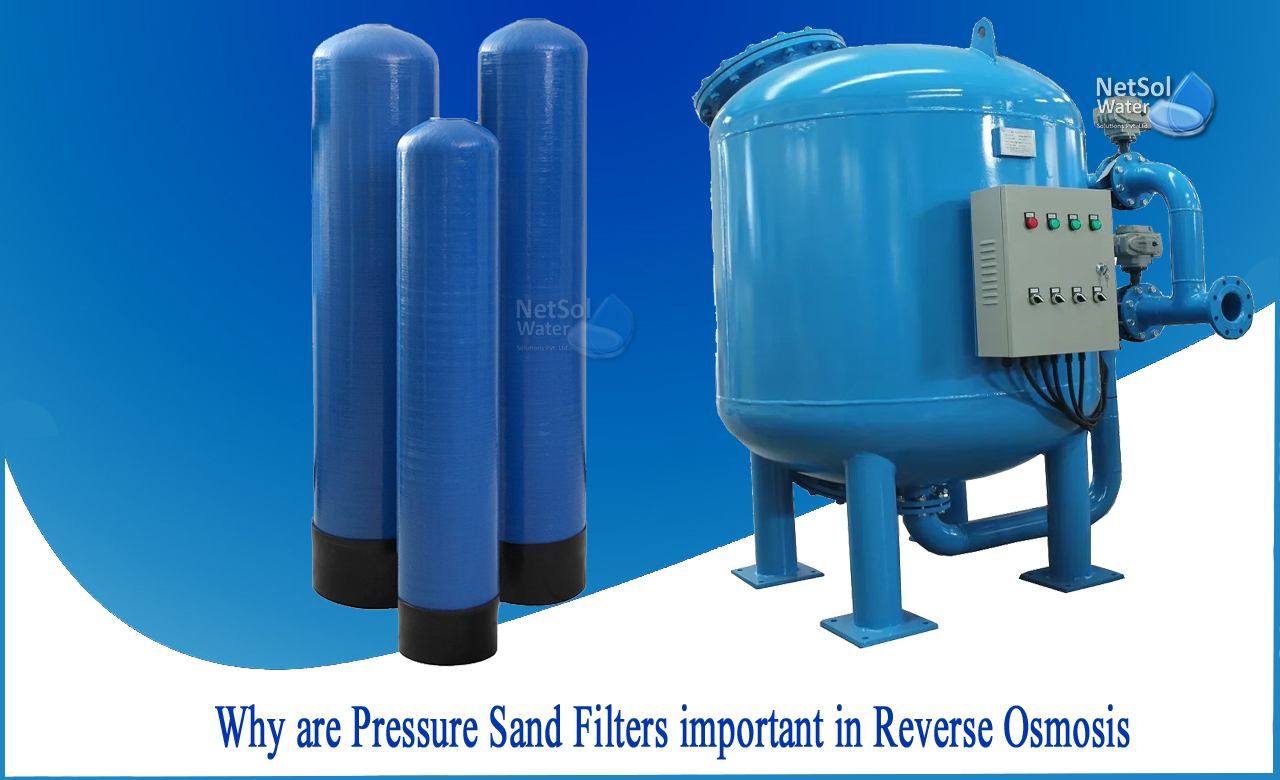Why are Pressure Sand Filters important in Reverse Osmosis?
Pressure Sand Filter or PSF is made up of many layers of sand, of various sizes and specific gravity. PSF is made to remove Suspended particles and turbidity from the feed water with the least amount of pressure drop possible. These filters are available in Mild Steel, Fiberglass Reinforced Plastic, or Stainless Steel, with face pipework and related Valves.
Removal of suspended particles with Pressure Sand Filters
The filter successfully reduces suspended particles to less than 5 ppm by removing up to 30 – 50 micron. The filter will need to be rinsed every day for 20 to 30 minutes with raw water. A cartridge filter is used to filter the partials below 30 - 50 microns.
Principle of Pressure Sand Filtration
The functioning principle of a Pressure Sand filter is quite simple. Water passes through multiple layers of filter media in a pressure sand filter, including reviewed sand and rock layers. The impurities in the water are collected in the media bed, and the sifted water is pumped into the tanks' discharge manifold. Discharging is the next stage, which entails properly expelling trapped pollutants from the media bed. After back washing, the filter is flushed with raw water, and the filter is returned to support once the needed nature of water has been achieved.
What are the areas of application of Pressure Sand Filters?
1: Membrane systems requiring pre-filtration as Reverse osmosis;
2: Treatment of Raw Water or drinking water production;
3: Filtration at the highest level;
4: Treatment of Cooling Water or cooling water preparation;
5: Treatment of Wastewater;
6: Treatment of Boiler Feed;
7: Swimming pool filtration;
8: Grey or surface water filtration;
Approximate diameter of sand in PSF
The desired sand diameter is highly dependent on the size of your sand filter, as well as the system's planned flow and filtration. Most filtration methods use sand with a diameter of 0.8 mm to 1.25 mm in most circumstances. This calculation, however, may fluctuate depending on the type of installation. A UV installation, for example, has a somewhat slow flow, therefore sand diameter between 0.4 and 0.8 mm will be appropriate for filtering restrictively.
The resistance of the filter increases as the sand diameter decreases, resulting in reduced flow. You can use a longer filter with less capacity for backwashing to guarantee that the diameter is modest. As a result, cleaning up the dirt is a lot easier.
Backwashing of Sand Filters
Sand Filter Backwash is a term used to describe the process of cleaning a sand filter.
The sand filter automatically switches to backwashing once a certain volume of water has been filtered or when the filtering sand has accumulated a significant amount of contaminants. The pores increase when the backwashing process begins, allowing the dirt trapped in the sand to be washed away. Following that, the dirt, together with the backwash water, is removed. Backwashing ensures that the sand filters do not become clogged during cleansing or post-cleansing, ensuring that the purifying properties are maintained.
Advantages of Pressure Sand Filters
1: Effective at Removing Turbidity and TSS;
2: Filtration efficiency can reach 5.0 parts per million (PPM) of suspended contaminants;
3: It's simple to use and maintain;
4: It has a large selection of filtration materials. Sand, gravel, charcoal, and other materials can be provided;
5: In terms of production and design, it's cost-effective;
6: It uses less energy to run;
7: Its flow rate is adaptable to seasonal variations.
What are the benefits of using a Pressure Sand Filter (PSF) in RO treatment facilities?
It is critical to guarantee that the water we use for drinking and sanitation is free of germs and illnesses. To ensure that the water we receive at home is germ-free, we employ a variety of water treatment systems. However, not all filters are effective, and contaminants can get past them.
In such instances, you'll need extremely efficient and dependable filters to ensure that your home's water is always pure. To reduce water pollutants, adding a pressure sand filter to your Whole house RO System is a good idea.
RO purification procedures can be aided with the use of sand filter technology!
The operation begins with disinfection filters being pre-filtered and the equipment being prepared for reverse osmosis. Recirculating systems, cleaning various water channels, irrigation systems, basin water filtration, and underground water purification can all benefit from these filters.
Why should you chose us for Water Treatment?
Netsol Water, based in Greater Noida, India, is a well-known industrial and commercial water and wastewater treatment plant manufacturer. We provide experienced water treatment solutions for all of your needs.
In accordance with industry standards, our treatment plants employ top quality raw materials and the most up-to-date equipment’s. Our treatment equipment’s are in high demand in the industrial and agricultural industries for a variety of applications.
Netsol Water is Greater Noida-based leading water & wastewater treatment plant manufacturer. We are industry's most demanding company based on client review and work quality. We are known as best commercial RO plant manufacturers, industrial RO plant manufacturer, sewage treatment plant manufacturer, Water Softener Plant Manufacturers and effluent treatment plant manufacturers. Apart from this 24x7 customer support is our USP. Call on +91-9650608473, or write us at enquiry@netsolwater.com for any support, inquiry or product-purchase related query.



